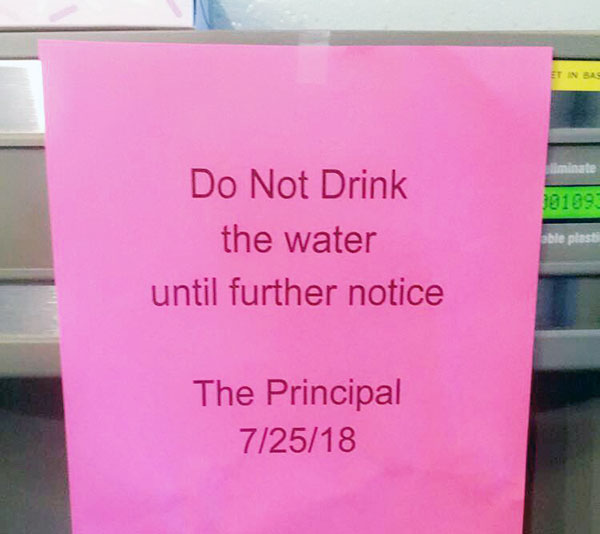Ongoing testing of the Warren Elementary School water will continue until the source of PFAS pollutants is found.
The water is currently being filtered with a carbon filter until a permanent solution is designed.
Stepping foot into Warren Elementary School, the situation is made clear immediately with a water fountain with a florescent pink sign reading “Do not drink the water until further notice.”
Warren’s water tested positive for PFAS in July. The school was one of 10 that the Vermont Department of Environmental Conservation tested as part of a pilot program. At a meeting held at the elementary school on Tuesday, September 4, members from the community, school board, and town select board were present to hear the latest results and plan of action from Kim Caldwell, hazardous site manager for the VT Department of Environmental Conservation (VT DEC) and Brownfields program manager; Sarah Vose, from the Vermont Department of Health; and Trish Coppolino, the environmental program manager for the VT DEC.
When Warren’s water was first tested in July it registered 36.6 parts per trillion of PFAS substance. The state standard is 20 parts per trillion.
Since then the public was made aware that the test sample could have been contaminated in the testing lab. As more samples were taken in intervals, test results have come back with lower numbers of PFAS. In the most recent results from a sample drawn August 23, the total was 14.1, representing 5.8 PFOA, 6.5 PFOS and 1.8 PFHS found.
PFAS can cause harmful effects on the immune system and, in serious cases, various forms of cancer. PFAS refers to a large group of compounds used in a variety of industrial processes and found in numerous consumer products including floor cleaners and waxes, nonstick products, cooking utensils and pans, food packaging and stain-repellent fabrics.
At this week’s meeting concerned community members asked if those living near the school should have their private wells tested, and asked whether schools should switch cleaning products and what the school tests regularly for in its water as well as seeking the plan of action.
According to Coppolino, PFAS compounds can contaminate water sources via septic systems.
The three-woman team recommended people have their septic tested regularly, and as for a plan of action, more testing will be conducted. A carbon treatment system was installed on August 30, and the water will continue to be tested.
As the contaminant’s origin source is still under investigation, Coppolino recommended waiting for the analysis to see if the contaminants come from the sewer system or the cleaning products.
Ray Daigle, director of facilities, said the school is testing its water regularly and reporting to the Department of Health. Contaminants that were detected are not one of the things that would trigger one of the tests conducted regularly. Chemical indicators in water that would trigger an imbalance or concern would be chloride, nitrate or total chloroform. As for changing cleaning products, he said the district uses state-approved cleaning products.
The state will test the soil further and until further notice Warren Elementary School will continue using bottled water until the most recent results (post carbon filter system) come back.






